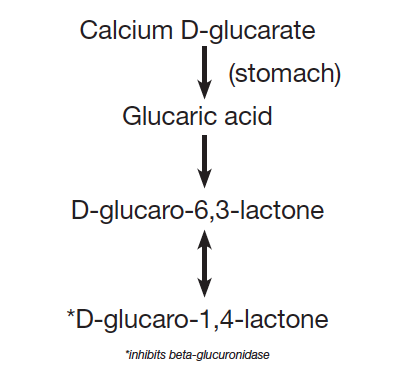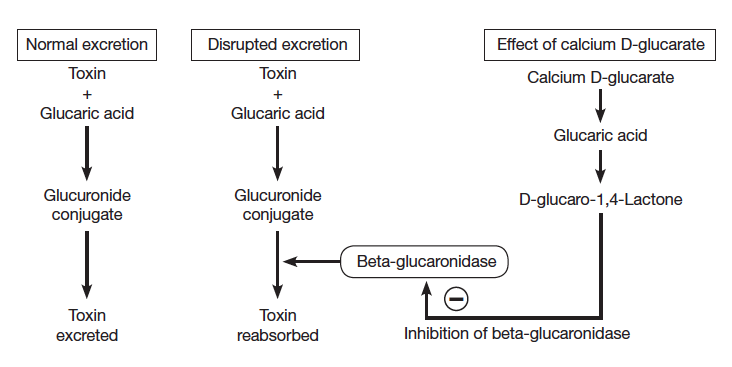Background
D-glucaric acid is a natural, non-toxic compound produced by the body in small amounts, in addition to being found in fruits and vegetables: the richest sources include oranges, apples, grapefruits and cruciferous vegetables.[1,2]
Calcium D-glucarate is the supplemental form of D-glucaric acid, where it is bound to calcium. When ingested, calcium d-glucarate is metabolised to D-glucaric acid, which may be further metabolised into D-glucaro-1,4-lactone or D-glucaro-6,3-lactone compounds which have important roles in the body, particularly in regards to detoxification.
The therapeutic benefits of calcium D-glucarate stem from its ability to indirectly inhibit beta-glucuronidase, an enzyme produced by colonic microflora which may disrupt phase 2 detoxification. Elevated beta-glucuronidase activity has been linked to increased risk of various cancers, in particular hormone-dependent cancers such as breast and prostate cancer.[2]
Metabolism of calcium-D-glucarate[3]


Key benefits
- Anti-carcinogenic
- Anti-inflammatory
- Enhances glucuronidation (phase 2 liver detoxification)
- Inhibits beta-glucuronidase
- Lipid lowering
- Regulates and supports healthy oestrogen metabolism
Clinical applications
- Oestrogen dominance or excess:
- endometriosis
- menorrhagia
- uterine fibroids
- Hyperlipidaemia
- Breast cancer
- Colon cancer
- Liver cancer
- Lung cancer
- Skin cancer
- Enhance detoxification
Mechanisms of action
Detoxification and inhibition of beta-glucuronidase
Glucuronidation is one of the primary pathways involved in phase 2 detoxification in the liver. Glucuronidation allows for the detoxification of endogenous compounds such as hormones and exogenous toxins such as drugs and carcinogens. During glucuronidation, glucuronic acid binds to potentially toxic compounds forming glucuronide conjugates. These newly formed glucuronide conjugates allows toxins, carcinogens and hormones to be safely eliminated from the body via the biliary tract.
Beta-glucuronidase is an enzyme produced by the colonic microflora.
It has a detrimental effect on detoxification by deconjugating glucuronide conjugates that are formed during phase 2 detoxification.[3] This breaking of the toxin-glucuronic acid bond allows for toxins and hormones to be reabsorbed rather than excreted.
Increased beta-glucuronidase activity has been associated with an increased risk of certain cancers including breast, prostate and colon.[2,4] By inhibiting beta-glucuronidase, calcium D-glucarate supports phase 2 detoxification by preventing the hydrolysis of glucuronide conjugates and increasing the detoxification and elimination of hormones, toxins and carcinogens.[5]
The acidic environment of the stomach allows for the metabolism of calcium D-glucarate into D-glucaric acid.[3] Further metabolism of D-glucaric acid results in the formation of D-glucaro-1,4-lactone ord-glucaro-6,3-lactone. D-glucaro-1,4-lactone appears to be the most active of the two, and is a potent beta-glucuronidase inhibitor.
Cancer
The majority of research surrounding calcium D-glucarate has focused on its effect on tumour growth and the prevention of cancer. In vitro and animal studies have shown that calcium d-glucarate inhibits the initiation and promotion of cancer cells by interacting with signal transduction pathways, inhibiting beta-glucuronidase activity, reducing pro-inflammatory cytokines, while also inducing apoptosis.[6] A range of studies have been conducted on breast, colon, liver, lung, prostate and skin animal tumour models, with the majority of research focusing on breast cancer.[3]
High beta-glucuronidase activity has been linked to low D-glucaric acid levels, which in turn is associated with an increased risk for various cancers.[3] By inhibiting beta-glucuronidase, calcium D-glucarate increases the detoxification and elimination of carcinogens and hormones associated with cancer development.[6]
Calcium D-glucarate reduces pro-inflammatory cytokines and increases the key anti-inflammatory and immune-regulating cytokine IL-10.
Pro-inflammatory cytokines are found in various tumours and may promote the transformation of precancerous cells to malignant cells, while also promoting tumour progression.[7]
Researchers have suggested that the formation of 1,4-GL from calcium D-glucarate may be the prerequisite for the prevention of breast, prostate and colon cancer in humans.[5]
Oestrogen metabolism
Oestrogen is metabolised in the liver during phase 2 detoxification, specifically via the glucuronidation pathway. Oestrogen combines with glucuronic acid forming an oestrogen-glucuronic acid conjugate.[8] This conjugate is then eliminated via the bile, allowing the body to maintain healthy oestrogen levels.
Increased beta-glucuronidase activity splits the oestrogen-glucuronic acid bond, causing the free oestrogen to be reabsorbed, which may increase oestrogen levels or lead to oestrogen dominance and a disturbed oestrogen:progesterone ratio.
Animal studies have shown that calcium D-glucarate lowers serum oestrogen levels and increases its urinary excretion.[5] This appears to be due to the inhibition of beta-glucuronidase causing reduced oestrogen reabsorption and lower circulating oestrogen levels.[8]
Calcium-D-glucarate enhances phase 2 glucuronidation by inhibiting beta-glucuronidase[3]


Clinical studies
D-glucarate reduces inflammatory biomarkers and enhances apoptosis in lung cancer
Background: To investigate the effect of dietary calcium D-glucarate on inflammatory cytokines, inflammatory biomarkers and apoptosis in lung tumorigenesis.
Subjects/Method: Animal study involving mice with induced lung tumorigenesis.
Intervention: Dietary calcium D-glucarate (2% and 4% w/w) for 8 weeks.
Results: D-glucarate decreased pro-inflammatory cytokines, while increasing the anti-inflammatory cytokine IL-10 during early post-initiation stages of lung tumorigenesis in mice. D-glucarate also exhibited proapoptotic effects. The researchers concluded that calcium D-glucarate may prevent lung cancer in tobacco smokers and ex-smokers by enhancing apoptosis and suppressing the acute inflammation and proliferation induced by tobacco-related carcinogens.
D-glucarate induces D-glucaro-1,4-lactone, a potent beta-glucuronidase inhibitor
Background: To demonstrate the in vivo formation of the beta-glucuronidase inhibitor D-glucaro-1,4-lactone (1,4-GL) from a D-glucarate salt and determine its metabolism, uptake by selected organs and excretion following oral administration.
Subjects/Method: Animal study.
Intervention: Male and female Sprague-Dawley rats received oral D-glucarate.
Results: D-glucarate administration resulted in the formation of 1,4-GL in the stomach of rats. The researchers concluded that the formation of 1,4-GL from d-glucaric acid derivatives may be a prerequisite for the inhibition of chemical carcinogenesis in rodents, and the prevention of breast, prostate and colon cancer in humans.
Calcium D-glucarate inhibits breast carcinogenesis
Background: To evaluate the effect of calcium D-glucarate on rat mammary carcinogenesis, compared to a known chemopreventive agent (N-(4-hydroxyphenyl) retinamide).
Subjects/Method: Animal study involving rats with induced mammary carcinogenesis.
Intervention: Dietary calcium glucarate (128 mmol/kg) fed during either the initiation, promotion, or combined initiation and promotion phases of mammary carcinogenesis.
Results: Compared to controls, mammary tumour incidence was reduced in the initiation phase by 18%, the promotion phase by 42% and both phases by 50% in rats fed a calcium D-glucarate-enriched diet.
Calcium D-glucarate also significantly increased tumour latency, and significantly reduced tumour multiplicity compared to controls. These results were similar to the chemopreventive agent.
Dosage range according to clinical studies
As human trials utilising calcium D-glucarate are still in the preliminary stages, the optimal recommended dosage is yet to be determined. The current available literature suggests a daily dosage of 1500-3000mg.[3]
Cautions and contraindications
- As hormonal detoxification is contraindicated in pregnancy, calcium D-glucarate use during pregnancy is not recommended.
- Alcohol consumption may increase calcium D-glucarate excretion and may theoretically decrease its activity.[8]
- Theoretically, calcium D-glucarate may increase the elimination of drugs metabolised via glucuronidation thereby reducing their effectiveness.[3]
REFERENCES
- Dwivedi C, Heck WJ, Downie AA, et al. Effect of calcium glucarate on beta-glucuronidase activity and glucarate content of certain vegetables and fruits. Biochem Med Metab Biol 1990;43(2):83-92. [Abstract]
- Zółtaszek R, Hanausek M, Kilianska ZM, et al. The biological role of d-glucaric acid and its derivatives: potential use in medicine. Postepy Hig Med Dosw 2008;62:451-462. [Abstract]
- Calcium-D-glucarate monograph. Altern Med Rev 2002;7(4):336-339. [PDF]
- Kim DH, Jin YH. Intestinal bacterial beta-glucuronidase activity of patients with colon cancer. Arch Pharm Res 2001;24(6):564-567. [Abstract]
- Walaszek Z, Szemraj J, Narog M, et al. Metabolism, uptake, and excretion of a D-glucaric acid salt and its potential use in cancer prevention. Cancer Detect Prev 1997;21(2):178-190. [Abstract]
- Calcium glucarate. Memorial Sloan Kettering Cancer Center 2012. Viewed 26 Feb 2015, http://www.mskcc.org/cancer-care/herb/calcium-glucarate
- Zoltaszek R, Kowalczyk P, Kowalczyk MC, et al. Dietary D-glucarate effects on the biomarkers of inflammation during early post-initiation stages of benzo[a]pyrene-induced lung tumorigenesis in A/J mice. Oncol Lett 2011;2(1):145-154. [Full text]
- Calcium D-glucarate. Natural Medicine Comprehensive Database 2015. Viewed 17 Feb 2015, www.naturaldatabase.com
DISCLAIMER:
The information provided on FX Medicine is for educational and informational purposes only. The information provided on this site is not, nor is it intended to be, a substitute for professional advice or care. Please seek the advice of a qualified health care professional in the event something you have read here raises questions or concerns regarding your health.


